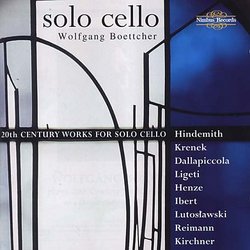| All Artists: Paul Hindemith, Ernst Krenek, Luigi Dallapiccola, Gyorgy Ligeti, Hans Werner Henze, Jacques Ibert, Witold Lutoslawski, Aribert Reimann, Volker David Kirchner Title: Solo Cello Members Wishing: 0 Total Copies: 0 Label: Nimbus Records Original Release Date: 1/1/1999 Re-Release Date: 9/14/1999 Genre: Classical Styles: Chamber Music, Historical Periods, Classical (c.1770-1830), Instruments, Strings Number of Discs: 1 SwapaCD Credits: 1 UPC: 710357561627 |
Search - Paul Hindemith, Ernst Krenek, Luigi Dallapiccola :: Solo Cello
 | Paul Hindemith, Ernst Krenek, Luigi Dallapiccola Solo Cello Genre: Classical
|
Larger Image |
CD Details |
CD ReviewsInductive Matthew T Close | Chesapeake, Virginia United States | 07/04/2001 (4 out of 5 stars) "Solo works tend to be personal for the composer, the performer, and the listener. This album allows its listener to get into the minds of some of the greatest musical geniuses of 20th century. Wolfgang Boettcher takes on a unique approach to the selections and his style is very clean. Every note gets a chance to make it to the listeners ear- something that is often forgot about by many performers. When all of these elements come together in a single album, it is worth listening to." Lover's of the Violoncello here it is! scarecrow | Chicago, Illinois United States | 01/31/2005 (5 out of 5 stars) "All the music here you cannot say it lumbers toward innovation, or structural interest, or subversion of concept, but it is all good solid cello solo music.and if you love the dark brooding timbres of this instrument you will certainly love these selections and Boettcher's performing abilities.
My favorite here is the Luigi Dallapiccoloa, his only work for the violoncello -he wasn't too prolific- more the maker of exquisite vocal music was his chosen life-genre. Here the sensitivity to timbre,clean/clarity of line- scaling back the sound to soft pianissimo, with a nice gentle bow, Dallapiccola has a rare gift of this inwardness, introspection to his music, he found other dimensions to the paradigm of the 12 tone dodecaphonic language, it is deeply lyrical yet with a sense of disquiet about it, he lived in exile himself and subjected to indignities in his life with the wars, and this music reveals a spirit that lived through it. The Hindemith Sonata OP. 25/3 is a straight forward solo, it does all the right things, deeply resonant, and stops to contemplate itself, punctuates the lines nicely, wonderful interplaying between the plucked and the bowed tone, single lines to doubke-stopped ones, (more than one tone played simultaneously) a very spirited work as well, much better I think than the cumbersome numerous Sonatas he wrote weighed down with piano accompaniment (the Trumpet Sonata is a huge work over half an hour) Paul Sacher was a patron of some(not all) of the post war avant-garde and here Witold Lutoslawski pays tribute to this benevolent benefactor.It is mildly interesting music, Lutoslawski was another not terribly prolific with mixed encumbered results to what he wrote, (either masterpieces or dredges of pieces) Aribert Reimann,another (creator of vocal music) has quite interesting work here, quite desolate,threadbare and abandoned revealing his straightforward demanor and gift for the lyric line, here harmonics are utilized to structure the simple anxiety ridden melody. The LigetiSonata here is an early work,(prior to his magnificent two string quartets) a student work and reveals his interest in the traditions,as related to the darknesses that was part of a life escaping from tyranny from Eastern Europe to the vibrant West of KOLN metropolis for the avant-garde. Likewise the Jaques Ibert piece here had a brooding darknesses to it, almost a clique for the violoncello language,fascinating when he breaks this darkness with sparce lines. This was an early work,not fully developed voice as yet, but again if you simply love the timbre of the cello it was beautiful. The Henze as well here a "Serenade" quite entertaining, full of wispy, quirky-nesses, plucked Spanish guitar like moments, Henze was a man of the theatre and you know it. Music that simply glides off the imagination,tails of desires. Ernest Krenek as well had a mixed moment to his music, the "Suite" here seems to not ascend off the conceptual ground too quickly. With Krenek, a late bloomer you must take each work and appraise it for its content. Not till he(Krenek) discovered deep serial music did his imagination soar, as in the latter "Piano Sonatas".(Of course Adorno said his music had little meaning, a wonderful compliment from Adorno who misunderstood the extremes of the musical avant-garde,for music must exist((he thought only within the recluse of a life)) their conceptual fluidity much of the time) Here the lines remain couched in darknesses, another man of exile. Boettcher is wonderfully imapssioned with all this music, renders whatever needs to be done from the glib surface lines in Henze to the robust spirited Hindemith, to the desolate Riemann all is played well, and this is great musical metaphors for the student of the violoncello." |

 Track Listings (28) - Disc #1
Track Listings (28) - Disc #1